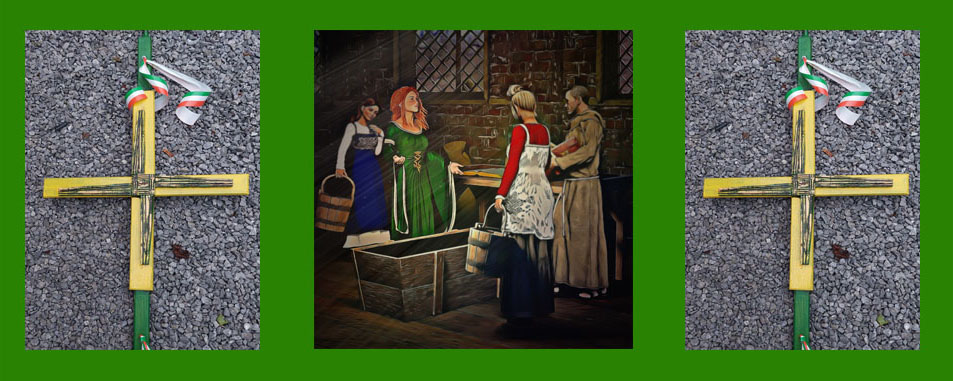She was a consecrated vessel for keeping Christ’s Body … She it is that helpeth every one who is in straits and in danger
Monday 6 February 2023 marks the first public holiday in Ireland in celebration of St Brigid, patron saint of poets and midwives. In 1877, Whitley Stokes, scholar and descendant of an old Kerry family, published a narrative about the saint from which the following accounts of her miracles are taken.[1]
Brigid, daughter of Dubthach (descendant of Fedlimid the Lawgiver[2]), was born in AD 450 at Fothart Murthemni.[3] She was reared till she was a handmaiden, ‘and everything to which her hand was set used to increase and reverence God. Every store of food which she saw and served used to grow. She bettered the sheep; she tended the blind; she fed the poor.’
Among the countless miracles ascribed to St Brigid, the following tells how she produced ale from one measure of malt, a story reminiscent of the loaves and the fishes:
When the solemnity of Easter drew nigh, Brigit set up, shortly before Maunday-Thursday, in a certain place near unto Bishop Mél. Brigit desired, through her charity, to brew ale for the many churches that were around her, and it was not usual to brew ale at that time. Brigit possessed only one measure of malt, and Brigit’s family had no vessels save two troughs. They made a tub of one of the two vessels, and they filled the other vessel with the ale, and the virgins kept taking the ale from Brigit to the churches, and still the vessel before Brigit remained full.[4]
‘Thus the produce of one measure of malt, through Brigit’s blessing, supplied seven churches of Fir Telach for the eight days of Easter.’

Another miracle tells how a bondsman was protected by St Brigid:
Once upon a time a bondsman of Brigit’s family was cutting firewood. It came to pass that he killed a pet fox of the King of Leinster’s. The bondsman was seized by the King. Brigit ordered a wild fox to come out of the wood. So he came and was playing and sporting for the hosts and the King at Brigit’s order. But when the fox had finished his feats he went safe back through the wood, with the hosts of Leinster behind him, both foot and horse and hound.
The following miracle conjures great spectacle:
Robbers stole Brigit’s oxen. The river Liffey rose against them. The oxen came home on the morrow with the robbers’ clothes on their horns.
At the end of her life, after founding churches and church-buildings in plenty, and miracles and wondrous deeds, St Brigid received communion from Ninnid the Pure-handed who sent her spirit thereafter to heaven.
‘Many miracles and marvels the Lord wrought for Saint Brigit … Such is their number that no one could relate them unless her own spirit, or an angel of God, should come from heaven to relate them.’
_________________________
[1] ‘Betha Brigte Incipit’ (pp49-89), Three Middle-Irish Homilies on The Lives of Saints Patrick, Brigit and Columba (1877) transcribed from the lithographic facsimile of the 15th century Lebar Brecc; edited by Whitley Stokes (1830-1909) and dedicated to Professor Ernst Windisch. The death of Mrs Letitia Stokes of Askive, Sneem, Co Kerry in December 1893 recalled her Kerry roots, her father being Francis Christopher Bland Esq of Derryquin Castle, and her mother Miss Lucy Herbert of Brewsterfield, Killarney, Co Kerry. Letitia Stokes was married to civil engineer Henry Stokes Esq, County Surveyor of Kerry, and her sons were Francis Christopher Stokes (1839-1839), Sir Henry Edward Stokes KCSI (1841-1926), William Herbert Stokes (1845-1874), Gabriel Stokes (1849-1920) and Dr Whitley Bland Stokes MD (1863-1906). Her nephew was James Franklin Fuller, CE. [2] ‘Son of Demre (or Dreimne), son of Bresal, son of Den, son of Conla, son of Artair (?), son of Art Corb, son of Cairpre the Champion, son of Cormac, son of Oengus the Dumb, son of 00Eochaid Find Fuathnart, son of Fedlimid the Lawgiver, etc.’ [3] Foughard, Co Louth, two miles north of Dundalk. [4] Another miracle is reminiscent of this one. It states: ‘A certain man of Brigit’s family once made some mead for the King of Leinster. When the King came to consume it, not a drop thereof was found for Brigit had given all the mead to the poor. Brigit at once rose up to protect the host, and blessed the vessels, and they were at once full of choice mead. For everything which Brigit used to ask of the Lord used to be given to her at once. For this was her desire: to feed the poor, to repel every hardship. To be gentle to every misery.’


